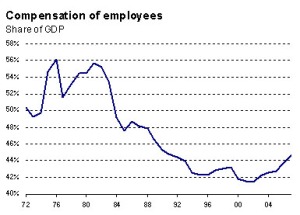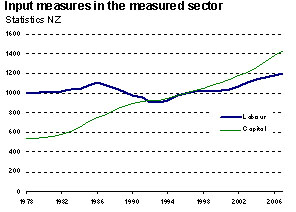Sorry, no conspiracy here
The Standard(*), No Right Turn(*), and Hard News(*) have all commented on a graph showing the declining share of labour compensation in national output over the period 1981-2002. The claim/implication is that right-wing policies have contributed to the drop in labour’s share, and that the Labour government’s policies have reversed that trend somewhat in recent years. Does this explanation make sense?
Source: Stats NZ (national accounts)
The classical economic explanation for labour/capital shares is that they will be set by the marginal product of labour and capital and hence invariant to government policy (apart from the effect of differing tax rates on factors). But once we assume some degree of imperfect competition, there is room for changes in bargaining power to affect the split.
However, the problem with assigning all of the change in labour compensation to bargaining power is that it ignores the fact that the underlying ratio of capital to labour has not been constant. It makes no sense to assume that the compensation share will be constant in the face of changes in the underlying inputs.
Turning to the Statistics NZ productivity data, we see that capital inputs have grown at a much more rapid rate than labour inputs over the period. So ceteris paribis, we would expect that an economy with much more capital per worker would have to pay a greater share of output in rents for that capital.
So why has the labour share risen in the last couple of years? Well, it could reflect the recent surge in labour input over the last couple of years. Or it could reflect a cyclical increase in bargaining power given the low unemployment rate. Or it could reflect a policy-driven structural change in bargaining power. Or it could be random noise (only 2006 and 2007 show any deviation from the trend of the last 12 years).
As a final aside, it should be pointed out that around a third of the drop in labour compensation over the 1981-2007 period reflects higher taxes, not an increase in gross operating surplus (capital share).
CPW















You’re using the wrong numbers and you’re wrong to say that I’m arguing there’s a ‘conspiracy’. there is no conspiracy there is just the same basic political competition that has been occurring since the beginning of the industrial revolution – the competition over division of the spoils of production between the ones who own the capital and those who make it work… quite naturally, the capitalists want to retian as much of the spoils of production as they can – as they legally own them and workers need to work to buy the necessitiates of life, the capitalsit is in a powerful position. Workers redress this through the political process, by organising into political parties, and through organising into unions.. using their numbers and solidarity to extract a better share of production…
… hence, the aim of a political party based around the capitalist class, a rightwing party, will always be to weaken the unions and workers’ bargaining power in general – thus lowering workers power and allowing capitalists to retain a larger share of production (as happened in NZ in the 1990s)… workers’ parties, parties of the Left, willalways seekt o strengthen the bargaining position of workers and their unions…
… both capitalists and workers are rationally motivated to seek a larger share of the cake at the other’s expense. Boh, of course, will want to create a larger cake too – both to placate the other side when demanding a bigger slice and so that larger slices are possible…
“The classical economic explanation for labour/capital shares is that they will be set by the marginal product of labour and capital and hence invariant to government policy”… the calssic theory is a bunch of crap becuase it doens’t recognise that the actors have different levels of bargaining power and that these levels cn be cahgned by legislation.
I didn’t see an argument anywhere in that rant. There is ample cross-country and historical evidence that wages are determined by labour productivity in the long-run, the idea that wage gains are primarily the result of the working class increasing their bargaining power is a myth.
The capital-labour share has no relevance for what you’re attempting to argue. Why not argue your point directly by claiming that the returns on capital in NZ are too high? Then tell me why New Zealanders’ have no interest in saving at these “unfairly high” rates of return, and we need to borrow from overseas to fund capital stock expansion?
I find that worker versus capitalist stuff pretty embarrassingly dated these days now that human capital is the primary driver of the income gap between rich and poor. It might be time to update your rhetoric for the 21st century.
“You’re using the wrong numbers”
It looks like CPW’s numbers are the same as yours, the X axis just goes back further.
“the calssic theory is a bunch of crap becuase it doens’t recognise that the actors have different levels of bargaining power and that these levels cn be cahgned by legislation”
That is why he mentioned imperfect competition and bargaining. I agree that bargaining relationship are important things. However, CPW’s point was to show that bargaining power wasn’t the SOLE determinent of the wage/GDP relationship – which implies that their are complications to the story that you were painting in your blog post.
“It might be time to update your rhetoric for the 21st century.”
You obviously haven’t been reading Naomi Klein CPW, its all the vogue now 😉
Marx might have been 19th century but Smith was 18th 😛
I note the sharpest decline in the % share happens before the Employment Contracts Act (that horrid act of violence upon the workers).
“I note the sharpest decline in the % share happens before the Employment Contracts Act”
Ahhh, “the system” was cutting workers rights in preparation of the cutting of workers rights – very interesting.
CPW nailed it.